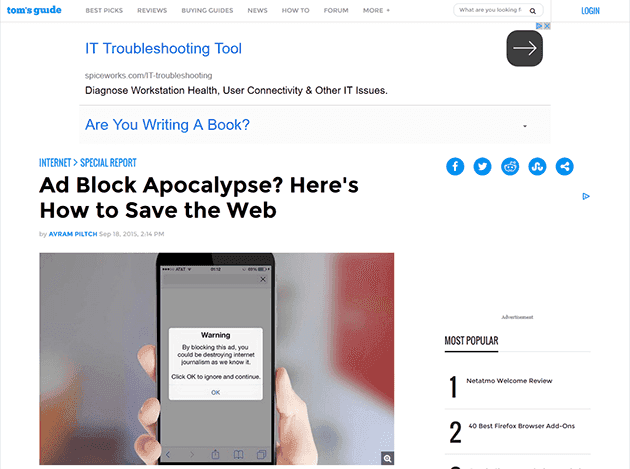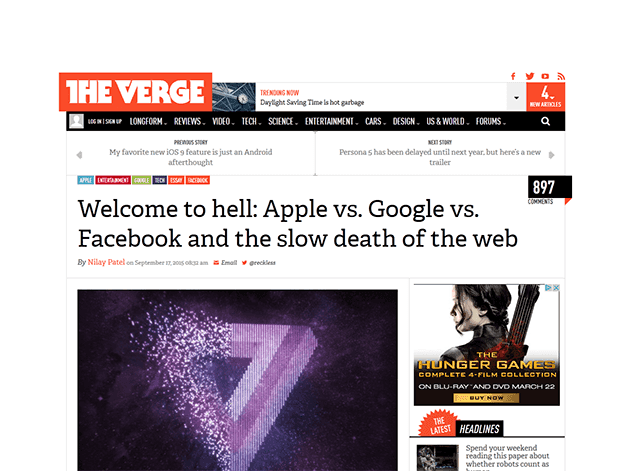When I was a kid, I used to live in the tiniest village, straight in the middle of nowhere, in Ontario. Not precisely out of choice, but moreso out of poverty, as the cruddy cottage houses that we lived in were painfully cheap, due to almost no insulation to be seen in them. This area was so tiny, and still is so tiny, that it's actually a pain in the ass to find a consistent image of the damn place (although while searching, I did find out that the absolute prick that spilled oil in the lake next to us never had to pay for it, which is nice).
More importantly, however, I was really into computers. This put me at odds with the environment around me, to say the least, as a poorly populated area isn't likely to be getting very good internet. And sure enough, this meant that when I was getting 100kb/s, I was praising the high heavens for such speed. When watching a YouTube video, I would pause the video and patiently wait a minute. Looking back at my old area, even now you're paying 35 dollars a month just for a bit over 600kb/s (and lord knows ISPs tend to only ever deliver widely below that...).
This sounds like a pretty weird thing to talk about. However, the reason I want to talk about all of that is because of this image:

This image shows the size of the average web-page, over the course of about a decade and a half. I began using computers at around 2001 at the age of 6, and had my own setup by 2003-4, where the average webpage was no more than 93kb, which was good enough for me. By that point, Web 2.0 was coming through; more images and videos inevitably resulted in larger pages. This was a perfectly reasonable tradeoff; by 2008, I was entirely okay with waiting 30 seconds for a 240p, 3MB video to load.
However... up until 2010, where I moved to a small town with noticeably more reasonable internet. I was noticing something. Despite the fact that I was always upgrading to better computers, and enjoying better performance over time, my connection to web pages were becoming more and more of a crawl. Was I being screwed? After checking speeds time and time again, I had simply realized that it wasn't my ISP, it was that, for some odd reason, and without much extra benefit, everything costed more. A simple web page for an article, nothing more than a bit of text, was shooting up in size, and would take upwards of ten seconds to simply load at all. What the hell is going on?
Funny thing is, even under that far more reasonable internet, of speeds reaching mild sanity, it was going to be much, much worse.
 from http://www.soasta.com/blog/page-bloat-average-web-page-2-mb/
from http://www.soasta.com/blog/page-bloat-average-web-page-2-mb/
At first, you could look at the above image and assume that more people want to put in bigger images, and very much, there's truth in that (this webpage will likely exceed that 93kb average from 2003, after all). However, the actual two causes of large images are 1) web developers being lazy and relying on browser solutions that don't work on every browser, and (far more importantly) 2) ad companies finding more ways to sell specified ads to you.
Notice the size of scripts has increased. The modern world of ad-tech is not simply satisfied with sending an ad to you, it wants to specifically send an ad to you, as in they wish to know as much about you as possible to do so. This is likely not news to you, as it's the core concept of which companies like Facebook make any money at all. Compare the two charts for a moment, and you might notice that the amount of space taken up by these scripts are over three times larger than a whole webpage was to begin with in 2003.
In order to prove this, I went to the New York Times' front page as a test run. All I had to do was get Firebug, and send it to the "Net" tab, which shows everything the browser downloads when loading the page. I also had a Hard Refresh extension to make sure each page had to be re-downloaded, but you can hard refresh without it, I'm just particularly lazy.
This is the page's size by default:

And now, after enabling uBlock Origin:

That's right, ads alone took up 1.6 MB of this page. About 27%, or, if we're speaking in anecdotes, about 16 more seconds to 9-year-old me. And I'm going to stick with that anecdotal comparison, for a simple reason: While I may not have to deal with such speeds now, the fact of the matter is, there's a large section of the world that still do, and it's foolish to ignore them simply because techies have it better. I should also note the "requests" on the side; a lot of the scripting that we're dealing with here from advertisers start seemingly small, but is made massive by the sheer number of them that interact. Expect the number to drop massively every time uBlock is enabled.
And speaking of techies, let's go see what they're doing! Since ad-blocking technology is so popular, and the modern technology news site has built their entire form of monetization under thus bulk, it's no surprise they don't fully know what to do:
 from http://www.tomsguide.com/us/save-web-from-ad-blocking,news-21611.html
from http://www.tomsguide.com/us/save-web-from-ad-blocking,news-21611.html
For all intents and purposes, this article is pretty reasonable about the whole thing; the author is well aware that it's what pays their bills, and has moral worries on that matter, but there's still at least some acknowledgement that it's a system built on datamining. And oh, the data:


About 1.1 MBs of data saved, or 11 seconds of waiting around for the 9 seconds of actual content. While I know ads are used as a form of income, I'd also raise an eyebrow if a TV station had 16 minutes of ads for 15 minutes of a TV show. And like I said above, those are one of the kinder articles compared to the usual:
 from http://www.theverge.com/2015/9/17/9338963/welcome-to-hell-apple-vs-google-vs-facebook-and-the-slow-death-of-the-web
from http://www.theverge.com/2015/9/17/9338963/welcome-to-hell-apple-vs-google-vs-facebook-and-the-slow-death-of-the-web
Yes, that's seriously an article about adverts. This is common when looking through technology sites, as they assume everyone else on the internet to either live in New York, San Diego, or both. Why on earth would The Verge be so mad at the idea of people attempting to slim down on size?


Ah. That would do it, wouldn't it?
I should note, however, that The Verge is a very, very special case. Mid-range laptops hanging on their webpages are fairly common, as are constant requests; while making those images, the website would still constantly give requests while I did absolutely nothing. One of the most infamous examples is when they feel like getting fancy during a review: this Apple Watch review is a fucking nightmare of javascript and high-resolution images, totalling in at 10.5 MB, and despite doing all of this on a fairly strong gaming computer, still managed to stutter while scrolling through.
Whatever web The Verge believes to be dying is a web that 9-year-old me would pass up on in favor of more Homestar Runner. That would be a full-blown web cartoon, lasting several minutes, and would barely break over 1MB. The Verge's article on Homestar Runner returning, on the flipside, is about 3.7 HR cartoons.
But of course, that's entitlement from me, right? They need all this fancy scripting, they need to do all of these privacy-invasive tracking to make money on ads, right? Well... no, no they don't. The current context of ad-tech is best described here, but in short: All the actual money within technology sectors are coming from investors, and not actually the people selling ads. This system is massive, and will inevitably collapse, resulting in all of that data they have on so many of us in the hands of very, very desperate people.
By comparison, here's what an ad used to be like:

This, according to Google's ad service, is the most common form of ad you can find, at 300x250. Remember all that data you'd save on other articles? Well, should you block this image, this webpage would only be a bit under 20kb smaller. Would you like to know how I managed to make it that small? Here's what I did:
That's it. This, according to the modern day web, is the most difficult thing you could ask for.